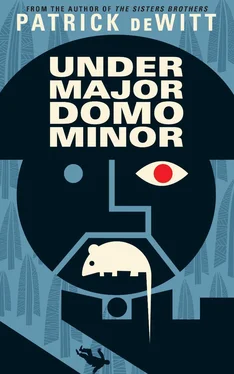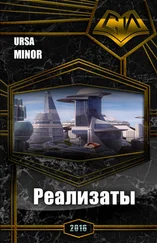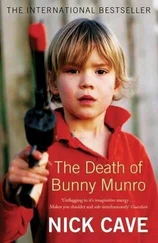The moment he had put his hand to the candle, then Lucy had an inkling of what was to come, and he hoped with great sincerity that he was incorrect, but he was not, and when the unlit half of the candle disappeared up the Baroness’s rear passage, he found himself wondering at the dark state of man, pondering the notions of freedom, and battling with a distant nausea. One by one the men leaned in and lit their cigars, then stood back to smoke and stare reverently at the woozy candle-flame. Perhaps a minute passed. The Baron asked the Duke,
“Whatever became of the shipping situation in your township?” The Duke stuck out his lower lip and shook his head.
“Tempest in a teapot.”
“You seemed concerned when I saw you last.”
“All for nothing. The union organizers were run out of town, and peace has been restored.”
“I’m happy to hear it. And how have your profits been this year?”
“Better all the while.”
“And the weather?”
“We’ve had a mild winter, thanks to God. And you, what of your interests?”
“As before.”
“Money always came to you.”
“It always has, actually.”
“Money comes to money, they say,” the Count offered.
“They say it and it’s true,” the Baron said appreciatively.
The Duchess and Countess, meanwhile, were warming themselves by the fireplace. There was a copious bouquet of yellow roses on the mantle; they began to take up the flowers, one by one, and toss them into the flames. The Baroness had lain still for some minutes but now removed the candle and walked to stand beside her friends. Reaching for a rose, she likewise cast this over the flames, and then again. And so: three naked and unspeaking women threw roses into a fireplace, one after the other, until the bouquet was gone. The men had returned to the settee; they watched their wives perform this mystifying endeavour with sombre expressions on their faces. When the roses had gone to ash, and the cigars had been snuffed out, the group dressed, bade one another goodnight, and retired in twos, first the Duke and Duchess, then the Count and Countess, and finally the Baron and Baroness.
Once alone, Lucy pulled up his trousers and stepped from behind the curtain. Agnes entered as he approached the door.
“Where in the world have you been?” she asked.
“Here, ma’am. The others have gone to bed.”
“Yes, the Count mentioned they were done. Did it seem that they enjoyed themselves?”
“Yes.”
“And did they enjoy their dinner?”
“Yes.”
“Did they enjoy the tart?”
“Yes.”
“They found it tasty?”
“Yes.”
“Did they actually say as much?”
“No.”
“But you got the impression they liked it, is that it?”
“Yes,” said Lucy. An unpleasant thought came to him. “When did you speak with the Count, ma’am?”
“He came into the scullery just now. Looking for a nibble, he said.”
“Where is Klara?”
“She’s also in the scullery, washing up.”
“Who else was with them?”
“No one.”
Lucy quit the room. Clear of the doorway, he started running. Agnes stayed behind, pouring herself a brandy, and sitting with a sigh on the settee. She sipped her drink, looking about the room with a wary expression. There was something about the ballroom that had always bothered her.
When Lucy entered the scullery the Count had Klara pinned in the corner. He was pulling up her dress, rubbing her underside, and licking her face; when she struggled to free herself he began to thrash her, shaking her about, that her head might roll from her shoulders. Lucy crossed the room in broad strides, as though he were floating, almost, or sliding across ice; snatching up Agnes’s marble pestle from the butcher’s block, he swung this at the back of the Count’s head, thinking to knock the man out, but at the last moment the Count turned, and so caught the pestle in the mouth. His skull was ricocheted off the stone wall and he dropped to his knees in a halted stupor. His top row of teeth was gone and rich, red-black blood drew down his face and into his shirtfront. It was moving faster than Lucy thought blood could move. He gestured to Klara, and she came and stood behind him. He was holding the pestle so tightly that his fingernails were sinking into the meat of his palm; when the resulting pain of this occurred to him he loosened his grip, and the pestle fell to the ground, breaking in two. He hadn’t struck anyone in his life before this.
The Count stood, leaning against the wall and watching Lucy and Klara with a divine confusion, as though he’d never seen them before — as though he’d never seen anyone before. He drew a finger across his chin and looked at it. Staggering to the basin, he inhaled, then spit out the shards. Straightening his lapels, he swivelled on his heels and addressed Lucy, his words made spheroid by the thick blood and dearth of teeth.
“How do I look, boy?”
“You have blood all down your face, sir.”
The Count pulled his kerchief from his breast pocket and dabbed at his cheek. “And now?”
“There is still a good deal of blood.”
He wiped the kerchief all around his face, smearing the blood and disimproving his state considerably. He offered Lucy a questioning glance.
“Much better, sir.”
The Count bowed to Lucy, and then to Klara. “Well, now,” he said, “the Sandman is calling me, and so I shall retire. Thank you both for a pleasant evening.”
“You’re welcome, sir,” said Lucy.
“You’re welcome,” said Klara.
The Count left the scullery, and Lucy and Klara watched the empty doorway. The Count reappeared, and Klara gripped Lucy’s hand.
“Which is my room? I can’t recall.”
Lucy pointed. “Up the stairs, sir, and second on your right.”
The Count left again. Lucy felt faint; he found himself blushing, and so was shy to face Klara. He closed his eyes as she wrapped her arms about his waist and pulled him closer. They held each other, and kissed, and were so very much in love.
In the morning, the Countess opened her eyes to find her husband’s face a butcher’s display of dried blood and flesh so raw and swollen as to produce a shine. She began to scream, and she continued screaming for a good long while.
The Count had no recollection of the incident with the pestle. Lucy had cleaned away the blood and tooth fragments in the scullery, as well as the button-like droplets which ran down the hallway and to the base of the stair. When this was deduced to be the blood’s point of origin, it was assumed the Count had tripped. The guests and their hosts re-enacted this happening the next morning, and they were very excited to be doing so, all except the Count, who stood back from the others, purple and ghastly. The Baron knelt to touch the blunt edge of a stone step, perhaps the very same one the Count had collided with, and a collective shiver ran through the assembled. The Count attempted to speak but his words were unintelligible. He repeated them, but only the Countess could understand, and she translated:
“He wonders where his teeth went.”
The Duke leaned forward. “Likely you ate them, my good man!”
The Count winced at the thought, then winced from the wincing.
“I suppose you’ll find out soon enough!” said the Duke.
The Duchess, who was suffering from a headache, said, “He’s not gone deaf, dear. Please keep your voice down.”
They moved to the breakfast table, where it was decided a medical presence was necessary. The Count agreed but would not consider seeing any doctor other than his court physician. The Baron said he would have a letter sent at once to fetch the man; but no, the Count preferred to recuperate in the comfort of his own estate. This point was argued but the Count was immovable, and now a pall settled over the table, for the premature departure of he and the Countess signalled the collapse of the group. And what of the Duke and Duchess? Yes, it would seem that they, too, were formulating plans to leave; already they were speaking of future meetings, and the unfortunateness of the Count’s taking a fall — the pity of it all. The Baron looked on, aggrieved, and a glint of desperation flashed in his eye. He pleaded with the others to stay, speaking of grand dinners and as yet untapped kegs of the finest wines; but none could be persuaded, and now all was silent save for the clattering of cutlery.
Читать дальше












